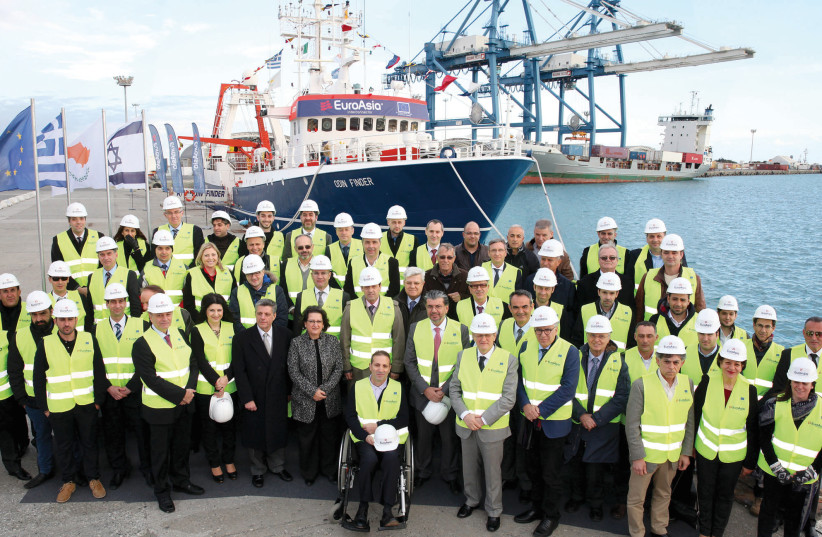The European Union committed 657 million euro ($732 million) on Wednesday to connect the electricity networks of Cyprus and Greece as the first step in forming the EuroAsia interconnector, which will eventually link the power grids of Israel, Cyprus, Greece and Europe.
The 898 km undersea line will end the energy isolation of Cyprus and allow the transmission of electricity in both directions. The line will reach a maximum sea depth of 3,000 meters, setting new world records for a project of this kind.
Cyprus is the last EU member remaining fully isolated without any electricity or gas interconnections.
The EuroAsia interconnector is set to be a 2,000 MW electricity interconnector between Israel, Cyprus, Greece and Europe through a 1,208 km undersea cable, creating an "energy highway" between Asia and Europe. The line will ensure a secure supply of electricity from Cypriot and Israeli gas reserves as well as from renewable energy sources.
The project is set to provide socio-economic benefits in the range of 10 billion euros, according to the project's website. Construction work is set to begin this year and to be completed at the end of 2025. The interconnector is expected to be commissioned in the first half of 2026.

The announcement of the funding comes as the US Biden administration informed Israel, Greece and Cyprus in recent weeks that it no longer supports the proposed EastMed natural-gas pipeline from Israel to Europe, in a reversal of US position from that of the Trump administration. The US did still express support for the EuroAsia interconnector.
"Recent months have reminded us again how crucial a well-integrated EU energy market is for ensuring affordable energy and security of supply, as well as the clean energy transition," said Kadri Simson, the European Commissioner for Energy. "While we have made remarkable progress in the last decade with making our market better connected, more can and should be done. I want to particularly highlight the EuroAsia interconnector, that will bring an end to the energy isolation of Cyprus and link it to the rest of Europe."
The Project Promoter of the EuroAsia Interconnector thanked the local and European officials for their continued cooperation and support on the project, stressing that it has "been decisive and essential since, as a European Project of Common Interest, ends the energy isolation and connects Cyprus to the single European energy market."
"The EuroAsia Interconnector is, perhaps, the most important energy infrastructure project for the whole of Cyprus, which ensures the achievement of the energy goals set within the context of the transition to a green economy, contributes to the increase of RES penetration and reduction of carbon dioxide (CO2) emissions and offers significant social, economic and environmental benefits to Cypriot and European consumers," said the project promoter.
The new funding was approved by the European Commission as part of a 1.037 billion euro investment in five cross-border infrastructure projects under the Connecting Europe Facility for trans-European energy networks.
